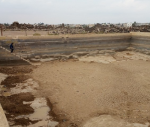You are here
Israel's unchecked power: A dangerous precedent for international law
Oct 29,2023 - Last updated at Oct 29,2023
In the geopolitical theatre, the intricate interplay between sovereign states and international law forms the bedrock upon which global order rests. However, a troubling pattern has emerged, raising questions about the accountability of powerful nations in adhering to international resolutions and laws. At the centre of this discourse lies the state of Israel, whose actions have often skirted the boundaries of international norms with apparent impunity. The recurring narrative of Israel's non-compliance with international resolutions and its apparent disregard for global legal frameworks raises significant concerns about the sanctity of international law.
Israel's continued defiance of international and United Nations resolutions has eroded the efficacy of these institutions, casting a shadow over their ability to ensure compliance and foster global stability. The persistent occupation of Palestinian territories, in contravention of multiple UN Security Council resolutions, has not only led to a protracted conflict but has also set a dangerous precedent for other nations to flout international norms with impunity. The absence of meaningful consequences for Israel's actions not only undermines the credibility of the UN but also emboldens other nations to flout international law when it suits their interests.
In recent developments, the UN General Assembly approved a resolution calling for a humanitarian truce in Gaza, underscoring the urgent need for alleviating the dire humanitarian situation in the region. However, the pressing question remains: Will Israel abide by this resolution? The history of Israel's responses to similar calls for ceasefire and humanitarian aid leaves room for skepticism. The absence of concrete mechanisms to enforce compliance raises doubts about the efficacy of such resolutions and the ability of the international community to compel Israel to adhere to them.
Israel's track record of selectively adhering to international resolutions and its persistent defiance of UN mandates pose a formidable challenge to the implementation of the newly proposed humanitarian truce. The absence of accountability mechanisms has emboldened Israel in the past, allowing it to operate with relative autonomy despite widespread international condemnation. The lack of tangible consequences for non-compliance has created an environment where Israel's actions are often met with little more than diplomatic reprimands, failing to yield any substantial change in behaviour.
Given the influential backing of certain global powers, the prospects of meaningful enforcement mechanisms being imposed on Israel remain slim. The unwavering support from powerful allies has shielded Israel from significant repercussions, thus creating an environment where international resolutions and calls for humanitarian aid are often met with calculated indifference. This shield of protection renders the prospects of outside forces compelling Israel to comply with the humanitarian truce resolution even more daunting.
Moreover, the absence of a unified and concerted approach from the international community further undermines the effectiveness of the UN resolution. The lack of a consolidated stance among member states weakens the UN's ability to exert meaningful pressure on Israel, allowing the nation to operate with a sense of immunity from external intervention. The fractured nature of the international response not only dilutes the impact of the resolution but also perpetuates the cycle of non-compliance with international law.
Despite the prevailing challenges, the need for concerted international action to enforce the humanitarian truce in Gaza remains paramount. The urgency of the humanitarian crisis demands a unified and resolute response from the international community to ensure the protection of innocent civilian lives. By fostering a cohesive and unwavering approach to compelling Israel's compliance with the resolution, the global community can send a strong message about the sanctity of international law and the imperative of safeguarding human rights, even in the face of political complexities and power dynamics.
Only through a resolute and collective commitment to upholding the principles of humanitarian aid and the sanctity of human life can the global community hope to foster a world order that is characterised by empathy, justice, and respect for international law. The success of the resolution hinges on the global community's ability to transcend geopolitical interests and work in unison to hold all nations accountable for their actions, regardless of their power and influence.
The complex web of international law, carefully woven to safeguard the sovereignty and rights of nations and individuals, is rendered ineffective in the face of Israel's continued transgressions. From settlements in the West Bank to the controversial annexation of East Jerusalem, Israel's actions have consistently defied the provisions laid out in various international agreements, including the Fourth Geneva Convention. The flagrant violation of these agreements not only deepens the chasm of mistrust between Israel and Palestine but also undermines the spirit of cooperation and diplomacy that the international community strives to foster.
The influence of powerful allies and their vested interests further complicates the enforcement of international law. The unwavering support extended to Israel by influential global powers has shielded the nation from meaningful repercussions, effectively granting it carte blanche to act with apparent impunity. This bolstering of Israel's position on the global stage has created an imbalance of power that undermines the principle of equality among nations, further eroding the foundations of international law.
Furthermore, the prevalence of a selective approach to enforcing international resolutions and law calls into question the integrity of the global community. The dichotomy between the swift enforcement of sanctions and embargoes on certain nations and the leniency extended to Israel paints a picture of a fragmented and skewed international legal system. This skewed approach not only fosters disillusionment among nations striving to adhere to global norms but also erodes the credibility of international institutions that are tasked with upholding the sanctity of international law.
The repercussions of Israel's unchecked power reverberate far beyond the borders of the Middle East, casting a pall over the efficacy and relevance of the United Nations and international law. As we navigate the complex landscape of global diplomacy, the need for an equitable and impartial approach to enforcing international law has never been more critical. It is imperative that the global community takes concerted and unwavering steps to ensure that no nation, regardless of its power or influence, remains above the reach of international law. Only through a collective commitment to upholding the tenets of international law can we foster a world order that is characterised by justice, equity, and peace for all nations.












Add new comment